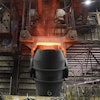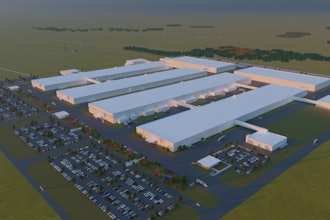
1
Manufacturers Leaning More on ai &
Machine Learning to Make up DigitaL
grounD
2
Over the next decade, AI and machine learning are
forecast to be disruptive technology game changers
for manufacturers and distributors, according to recent
research from Forrester. While most companies are
implementing multi-year ‘digitization’ strategies, the
real and immediate growth will be achieved by turning
a variety of digital devices and technologies into
intelligent, thinking machines, experts say.
Here, we’ll discuss how manufacturers and distributors
can move beyond digitization and become a truly
digitally transformed company that leverages AI and
machine learning to increase return on investment (ROI)
and revenue.
Manufacturers Leaning More on ai &
Machine Learning to Make up DigitaL
grounD
ai anD Machine Learning: the nuts
anD BoLts
Machine learning should be thought of as both a noun
and a verb, says Michael Wu, chief AI strategist at PROS.
“As a noun, it’s just an algorithm that data scientists use to
derive meaning. And as a verb, it is the transformation of
data into a model or outcome.”
When used in AI, machine learning acts as a feedback
loop. The outcome of a certain process is recorded
and then fed back into the big data supply, increasing,
updating, and resulting in a better model and outcome.
Ultimately, the AI’s performance keeps improving
because it takes into account the data that is continuously
being fed back into it.
Simply put by Wu, “Modern AI learns now.”
As the quantity of data increases, data management is
becoming a bigger piece of the pie. Previously, data
scientists were able to both interpret and manage
a company’s data. However, making sure data is
maintained and stored both properly and safely has
become a full-time job. Similarly, with so much data from
which to derive meaning, data scientists have less time to
keep track of the data itself.
BeyonD Digitization
To keep up with the digital trend, many manufacturers
and distributors have started the long journey of
digitizing their processes and operations. However, as
Wu explains, digitization is only the first step to true
digital transformation.
“Digitization is important because in order for AI to work,
you need to have data initially to power it. Without it,
there is no input and it won’t know what to do. It’s the
first step,” Wu explains. “But it cannot be the only step,
otherwise you won’t get anywhere. Once you have data,
you need to turn it into insight by applying it to AI and
machine learning.”
As a result of their digitization strategies, the majority
of companies have a lot of sensors that are capturing
endless amounts of data. Richard Blatcher, senior
industry solutions manager at PROS, says the challenge
manufacturers face now is to figure out what to do with
all the data and how to turn it into actionable insight.
“Most companies appear to have done everything they
can from a cost savings perspective in the materials costs,
manufacturing processes, and operational efficiency,”
according to Blatcher. “AI and machine learning is the
next level of business transformation and it must come
from all perspectives.”
This level of planning requires a good deal of vision and
foresight. But Wu says the results are worth it.
“Once AI and machine learning are fully implemented,
a company will likely see results and improved
performance very quickly. For most processes, it’s a
matter of days and weeks.”
3
choosing the right pLace anD
pLatforM
Where exactly to implement AI and machine learning
depends upon the most critical problems faced by the
manufacturer or distributor. Perhaps even more crucially,
it is often best to begin with units that have the biggest
effect on ROI.
Transforming a company digitally is a very long and
expensive journey. It takes a good deal of resources.
Because of this, the best approach is to initially
implement AI and machine learning in the areas proven
to have the greatest potential impact on revenue. That
way, the funds generated by that initial implementation
can fund the rest of the digital transformation.
“Start with things that have the biggest effect on ROI
and margins,” Blatcher suggests. “It could even be
identifying sales opportunities or optimizing price. These
are commonly overlooked areas, but many studies
have shown that these areas have significant impact on
revenue.”
Additionally, most businesses already have sales and
price data just sitting around, waiting to be turned into
insightful action.
“There are many examples of manufacturers that
are already applying this technology, are looking at
price optimization, customer experience, and other
such areas,” Blatcher says. “These are bite-size chunks
within the manufacturing and distribution business
where there already is a huge amount of data, and
now they’re applying those models, algorithms, and
decisions automatically to those business units and are
immediately seeing results.”
When selecting an AI or machine learning platform,
businesses should be careful to choose technologies that
work within their current domain and legacy systems.
Furthermore, because of the complexity and expense
required to implement AI, the process often is done in
stages. Therefore, when adding business units along the
way, it is important to prioritize integration. Otherwise,
systems operating on different platforms will remain
siloed and it will become impossible for a company to
truly transform.
Similarly, when companies or units merge through
acquisition, some technical hurdles may arise, particularly
if different data models exist. However, Wu believes that
planning ahead and being prepared to tackle obstacles
as they emerge will go a long way toward securing a
successful integration.
Companies no longer are standing by idly as the
business climate continues to evolve through big data
collection and automation technology. They are realizing
they must do something to stay competitive, and
many are pursuing AI solutions to complete the digital
transformation.
For the manufacturers and distributers still on the fence
about digitization, Wu has one piece of advice: “Do it
quickly or else you won’t be in business for very long.”
4
The information in this report
was researched and produced by
Advantage Business Marketing
in conjunction with PROS.
PROS Holdings, Inc. (NYSE: PRO)
is a revenue and profit realization
company that helps B2B and B2C
customers realize their potential
through the blend of simplicity and
data science. PROS offers cloud
solutions to help accelerate sales,
formulate winning pricing strategies
and align product, demand and
availability. PROS revenue and
profit realization solutions are
designed to allow customers to
experience meaningful revenue
growth, sustained profitability and
modernized business processes.
To learn more, visit pros.com.
aBout this
report
aBout pros






















